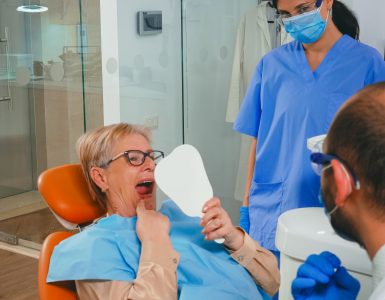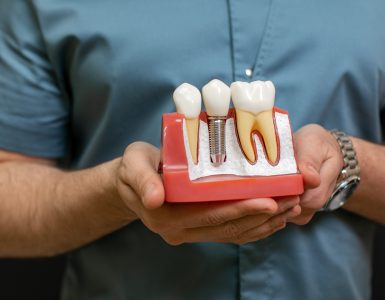Whilst most of us are aware of the effects of smoking on our general health causing many medical problems that can sometimes be fatal, many people may not be aware of the effect that smoking can have their oral health by affecting their teeth, gums and mouth.
- Stained teeth. Smoking exposes your teeth to both tobacco and nicotine, which can have the effect of staining or yellowing of the teeth. Heavy and long-term smokers often find that their teeth are almost brown after years of smoking.
- Increased build-up of plaque and tartar on the teeth. Smokers tend to have more tartar on their teeth than non-smokers. This is because the nicotine in the tobacco reduces the production of saliva in the mouth thereby making it easier for bacteria and tartar to build up.
- Whitening of the soft tissue in the mouth. A white patch can develop on the roof or other areas of the mouth in smokers and is known as smoker’s keratosis. Being painless, you might not even be aware it is there and is often discovered during a check-up with your dentist. Whilst smoker’s keratosis is not dangerous and needs no treatment, it can mimic the appearance of leukoplakia, which is potentially cancerous and requires treatment, and any white patches should be examined by your dentist.
- Gum or periodontal disease. Smoking can lower your immune system, which makes you more susceptible to gum disease, an infection that affects the gum line. It can develop when bacteria and tartar build up below or above the gums, more common in smokers, resulting in inflammation. Smoking can also reduce the amount of oxygen in the bloodstream and blood flow to the gums affecting the healing of infected gums. This infection, if not treated, can damage the bone and structures that hold the tooth to the gum resulting in loosening of the teeth and potential tooth loss.
- Mouth cancer. Smoking is one of the main risk factors in developing mouth cancer. For people who smoke and drink alcohol the risk is considerably higher than for those who just do one or the other. Mouth cancer in people who smoke is most likely to occur on the side of the tongue, the floor of the mouth and lips, but it can also happen in other areas of the mouth such as the cheeks, the roof of the mouth and gums. It is important that if you notice any changes in your mouth you contact your dentist or doctor straight away, as if diagnosed early it can be treated before it spreads to other parts of your body.
- Bad Breath. Bad breath can be an unwelcome side effect of smoking. Smoking causes your mouth to dry out due to a decrease in saliva. Saliva acts as a natural wash for your mouth and lack of it can cause the cigarette smell to linger. Being in the early stages of gum disease can also cause bad breath. Smoke that remains in the lungs is breathed out when you exhale adding to the problem.
- Slow healing after dental treatments and surgery. Because of the effect of smoking on the immune system, healing can be delayed following tooth extractions and oral or gum surgery and can result in increased pain. Slow healing following the removal of a tooth can cause dry socket, which is very painful.
Regular check-ups with your dentist are important to identify and treat any smoking related problems that may arise with your teeth, gums and mouth and to advise on the preventative steps you can take by utilising good oral hygiene.













